Backdoor entry to Australia?
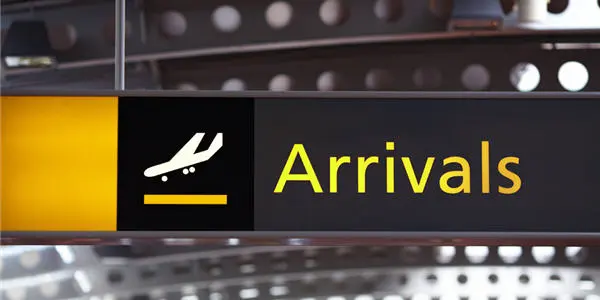
05 May 2017
Michael Reddell
In the various articles in the last few days on Australia's decision to increase university fees for, among others, New Zealanders studying at Australian universities, there have been a few references to the fear sometimes expressed by Australian officials and politicians that New Zealand's relatively liberal immigration policy might be being used by some material number of our migrants as a backdoor entry to Australia. Come to New Zealand, stay a few years and get citizenship, and then move on to Australia and the better-paid jobs that a more productive economy can offer.
It had some plausibility as an argument 20 years or so ago, when New Zealand's immigration policy was much more open than Australia's. Any difference between the two countries' immigration policies is much less marked now (they liberalised late in the Howard years).
It also hasn't been an issue that I've paid much attention to - it is, after all, mostly a matter for Australian policymakers. But I thought I would take a quick look at the data SNZ has available on Infoshare.
Using the PLT data (with all its limitations) one can find numbers on the gross and net flows of New Zealand citizens between New Zealand and Australia, and also on the birthplaces (by country) of those making the move. So one can easily work out what share of the New Zealand citizens moving to Australia (and coming back) were born in Australia and New Zealand, and what share were born elsewhere. The data seem to be available only for the last 15 years.
Note that birthplaces don't necessarily tie up closely with migration status. I suspect that the bulk of Australian-born New Zealand citizens in these charts are the kids of New Zealanders who went to Australia for a few years, had a family there, and then came home. And some portion of those born outside Australia and New Zealand will also be the children of New Zealanders, with citizenship by descent. But the bulk of the movement of New Zealand citizens who were born outside Australia and New Zealand is likely to be people who were first given entry to New Zealand under our immigration policy. Of course, some of the New Zealand born might be children born shortly after their parents arrived as immigrants, and thus in some sense also a phenomenon of the immigration policy.
Here is the chart for the net flow.
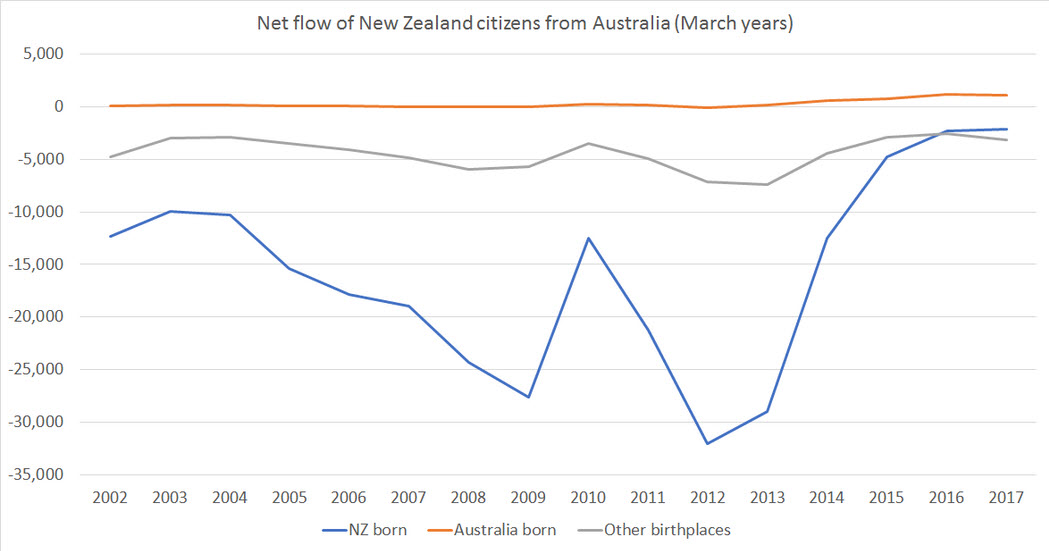
The Australia-born flow is small, and pretty stable, but has increased a bit in the last few years. But the bulk of the action is in the New Zealand born line.
What of the non-Australasian born (our proxy for people who were policy-permitted immigrants to New Zealand? That line looks like a very muted version of the NZ-born line - many of the same fluctuations but on a much less pronounced scale. Curiously, right at the moment more non-Australasian born New Zealanders are (net) leaving for Australia than NZ born NZ citizens. Perhaps that might suggest there was something to the reported Australian concern. But these are small net numbers of two quite large sets of gross flows. So let's go directly to the gross flows.
This chart shows PLT arrivals of NZ citizens from Australia (the much-vaunted people “coming home”).
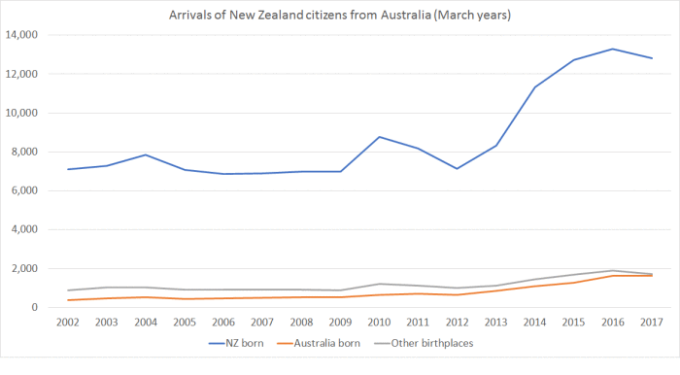
All three lines have increased in the last few years, with the largest percentage increase in the (small number) of Australian-born NZ citizens. Non-Australasian NZ citizens coming back from Australia make up around 11 per cent of the total, and have done throughout the period we have data for.
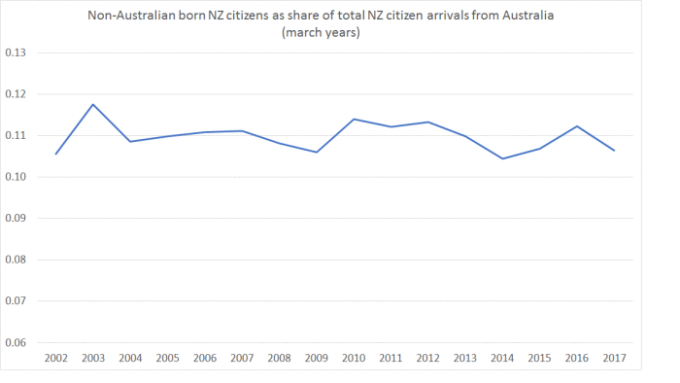
Of course, 11 per cent is a lot less than the foreign-born share of the population (around 25 per cent), but that foreign-born population share has been increasing quite a lot in the last 15 years or so.
There is probably a lot more interest in the outflows to Australia. Here is the same breakdown of NZ citizens by birthplace for departures.
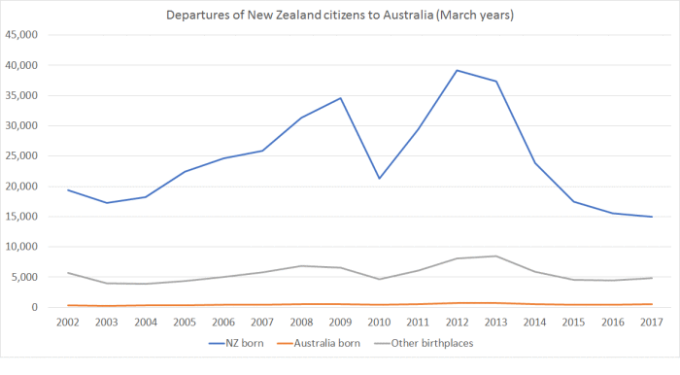
The numbers of Australian-born NZ citizens leaving for Australia has increased, but the numbers are very small. And by far the largest absolute change has been in the NZ-born series - outflows in the latest year to March are the lowest for any year in the data set. But what of the non-Australasian born (the people who mostly initially came to New Zealand as immigrants?).
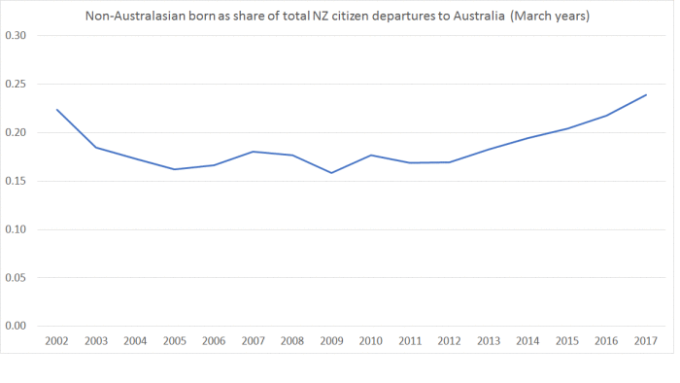
Somewhat to my surprise, there has been quite a step up in the share of that group in the total outflows to Australia of NZ citizens. In the most recent year, that share was 24 per cent, up from the around 17 per cent it had fluctuated around for some time.
Of course, as I noted foreign-born people make up around 25 per cent of the total population (that share may be higher again by next year's Census). So it shouldn't surprise us that in the normal course of life, quite a few non-New Zealand born citizens will move to the better opportunities in Australia. Some will be, for example, people who came as 2 year olds 40 years ago, and whose behaviour and motives are likely to be very similar to those of the NZ born. The cold truth is that, typically, economic opportunities are better in Australia than they are in New Zealand.
And on the other hand, it is also likely that anyone who was sufficiently motivated to leave some foreign home and come to the ends of the earth (New Zealand) might, on average, be less settled, and more ready to move again, than someone who had spent their whole life here. That is an almost inescapable feature (not bug) of immigration, and doesn't suggest any deliberate gaming of the system.
It is also worth pointing out that even if there is some gaming going on, the lags aren't short. The outflow of non-NZ born citizens in the last few years has nothing to do with NZ immigration policy in the last few years, because you have to have been here for five years to become a New Zealand citizen in the first place. And, as I understand, when you apply for citizenship you have to sign a declaration stating that you intend to stay. So, if there is the sort of issue Australians apparently worry about, it is quite a slow-burning story.
I don't want to reach any strong conclusions (and I keep reminding people of the limitations of the self-reported intentions PLT data), but the twin facts:
- the foreign-born share of NZ citizens coming back from Australia is so much less than the share going to Australia, and
- the significant increase in the foreign-born share of NZ citizen departures in recent years
might suggest there is a little more of that sort of “backdoor entry” going on than I might previously have supposed.
If so, of course, it is totally rational behaviour on the part of the immigrants. As I've repeatedly noted, and as I've even heard pro-immigration academics acknowledge, New Zealand isn't a first choice for lots of migrants. If they could get into Australia most would probably choose it over New Zealand (a bigger, higher income, country/market). And they'd probably prefer the US, the UK, Ireland, and probably even Canada over New Zealand. You take what you can get, and make the most of the opportunities that arise. For those who become New Zealand citizens, access to the Australian labour market is one of those opportunities.
If we were genuinely attracting really highly-skilled migrants, that would be our loss and Australia's gain, when they do move on. But of course MBIE's own data confirms that all too many aren't that highly-skilled at all. We don't know what the skill mix looks like for those who later move on to Australia, but since the overall NZ outflow to Australia is often described as “looking like NZ” (in terms of skills/qualifications), perhaps it isn't very different for once-immigrants who also move on.
I was planning to go on and write about how we should think about the option to move to Australia, and gradual changes that have made things tougher for New Zealanders doing so, but perhaps I'll save that for another day.
And I won't devote a post to the latest PR on Stuff from the MBIE-funded Professor Paul Spoonley. Suffice to say that, relative to his piece in the Herald earlier in the week, he appears to have doubled down. In that piece, even he thought some reforms were needed. But now…
Record immigration levels are not a bad thing for New Zealand, provided the current high standards for entry remain, an immigration expert says.
It was MBIE's own data that showed that more than half of skilled migrant applicants couldn't command more than $49,000 per annum in the New Zealand labour market.
And while this time he avoids direct use of the “xenophobia” slur, his case still seems to rest mostly on slurs and assertions.
But heading into elections, Spoonley said, it is important to call out prejudice in our leaders to avoid anti-immigration policies similar to the US.
“Let's continue to debate immigration,” he said. “But let's not stereotype or see one group or another as a problem.”
Instead of “xenophobia” now it is “prejudice” he claims to worry about. Of course, he adduces no evidence, or examples, of such “prejudices”, or of how they are somehow driving the debate. And as for US immigration policy, the immigration policy run under Barack Obama's administration had its pros and cons (it wasn't very skills focused), but the overall number of green cards issued per capita was around one third of the number of residence approvals we currently grant.
And, of course, the issue is hardly ever the migrants. They are just people trying to make the best for themselves and their families. The issue is, and should be, immigration policy choices made by our politicians, and by us as a society.
About the author
Michael Reddell has spent 30+ years doing economic analysis and policy advice in a range of institutions, in New Zealand and overseas. Most of that time was at the Reserve Bank, including a spell as Head of Financial Markets, responsible for monetary policy implementation, foreign reserves management, and the analysis of financial system risks. He spent 25+ years on the (equivalent of the) OCR Advisory Group to the Governor, and many years on the Bank's key internal financial regulation policy committee.
Read the Croaking Cassandra article.